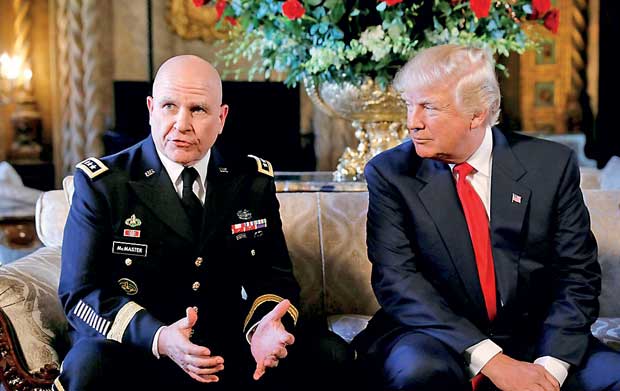22 Feb 2017 - {{hitsCtrl.values.hits}}

(c) 2017, The Washington Post · John Wagner, Missy Ryan, Greg Jaffe · NATIONAL, NATIONAL-SECURITY · Feb 21, 2017 - 6:31 AM
President Donald Trump on Monday named Army Lt. Gen. H.R. McMaster as his new national security adviser, replacing the ousted Michael Flynn - a move meant to help put the White House on firmer footing after missteps on multiple fronts.
Trump called McMaster “a man of tremendous talent and tremendous experience” while briefly introducing him to reporters at the president’s Mar-a-Lago estate in Florida before returning to Washington, D.C.
In tapping McMaster, Trump turned to a widely respected and fiercely outspoken military strategist who was recognized for his battlefield leadership during both the Persian Gulf War and the Iraq War.
But unlike many officers, McMaster has spent virtually no time at the Pentagon or in Washington, which could prove a challenge in his new role.
Retired Army Lt. Gen. Keith Kellogg, who has been serving as acting national security adviser, will return to his role as the National Security Council Chief of Staff.
“I think that combination is something very, very special,” Trump said, later adding: “What a team. This is a great team.”
Both men were among several candidates whom White House aides said Trump had planned to interview over the weekend to replace Flynn, a retired general and an early and vociferous Trump political supporter.
Flynn was asked to resign last week amid allegations that he discussed U.S. sanctions with a Russian official before Trump took office and then misrepresented the content of that conversation to Vice President Mike Pence and other administration officials.
Trump’s first choice of a replacement - retired Navy Vice Adm. Robert Harward - turned him down, compounding the embarrassment surrounding the episode.
Trump’s bid to move forward with a replacement comes as his fledgling administration is seeking a reset on several fronts. The president has pledged to issue a new executive order this week replacing his court-frozen directive on immigration, which has come to symbolize his struggle to translate ambitious campaign promises into policy.
The national security adviser, part of the senior White House staff, serves as the chief in-house counsellor to the president on national security issues and has traditionally sought to play the role of a broker among agencies. The position does not require Senate confirmation.
McMaster will assume the position at a time of widespread security challenges, including Russia’s alleged meddling in last year’s election and North Korea’s ballistic missile test this month.
McMaster is widely known as smart, intense and fiercely outspoken, qualities that have won him wide praise among his fellow officers - and have sometimes grated on his superiors.
A White House official said McMaster will not retire from the military but will remain a three-star general, as Colin Powell did as Ronald Reagan’s national security adviser.
Peter Feaver, a scholar on civil-military ties at Duke University, said he expected McMaster to take a skeptical view of Russia, seeing Moscow as a dubious partner and major potential threat to U.S. security. And Feaver said he expects a similar skepticism toward Iran, whose support for proxy groups across the Middle East many senior military officials say has gone unchecked, despite President Barack Obama’s nuclear deal with Tehran.
McMaster “also brings a deep personal understanding of what it means to go to war, and be at war for a very long time,” said David Barno, a retired lieutenant general who knows him well.
Barno suggested that McMaster would distinguish himself at the White House in coordinating rather than dictating policy.
“I don’t see H.R. as director of an orchestra; I see him as someone who is getting all the instruments to play together,” he said.
From his earliest moments as an officer, McMaster stood out among his peers. He earned a Silver Star for valor in the 1991 Gulf War when his armored company destroyed a much larger Iraqi formation in one of the opening battles. The Army’s official history of the conflict opened with a vivid description of his tank crew in action that day.
McMaster earned a doctorate in history from the University of North Carolina and turned his thesis into a widely acclaimed book on Vietnam, “Dereliction of Duty.” Relying on declassified documents, McMaster argued that the generals in Vietnam had caved in to political pressure and supported a war strategy they knew could not prevail.
In the Iraq War, McMaster commanded a 3,500-soldier brigade in the northern city of Tal Afar, which was being torn apart in 2005 by Iraq’s civil war. He largely jettisoned the Bush administration’s official strategy at the time of pulling back from cities and training Iraqi forces to take over the fight so U.S. troops could go home.
McMaster pushed his troops deep into Tal Afar, establishing 29 small American-manned command outposts. Instead of focusing on training the Iraqis, McMaster and his troops worked to stop the killing in the city and replace the local mayor and security forces.
“It’s unclear to me how a higher degree of passivity would advance our mission,” he said at the time in response to criticism.
Eventually his strategy, dubbed “clear, hold and build,” became a model for the broader campaign, led by Gen. David Petraeus, to stabilize Iraq in 2007 and 2008.
McMaster’s passion, intensity and high tolerance for risk sometimes put him at odds with his superiors. He was twice passed over for promotion to general before finally earning one-star rank. The panel that promoted him was led by Petraeus, one of his staunchest backers in the Army.
17 Nov 2024 11 minute ago
17 Nov 2024 38 minute ago
17 Nov 2024 2 hours ago
17 Nov 2024 2 hours ago
17 Nov 2024 4 hours ago